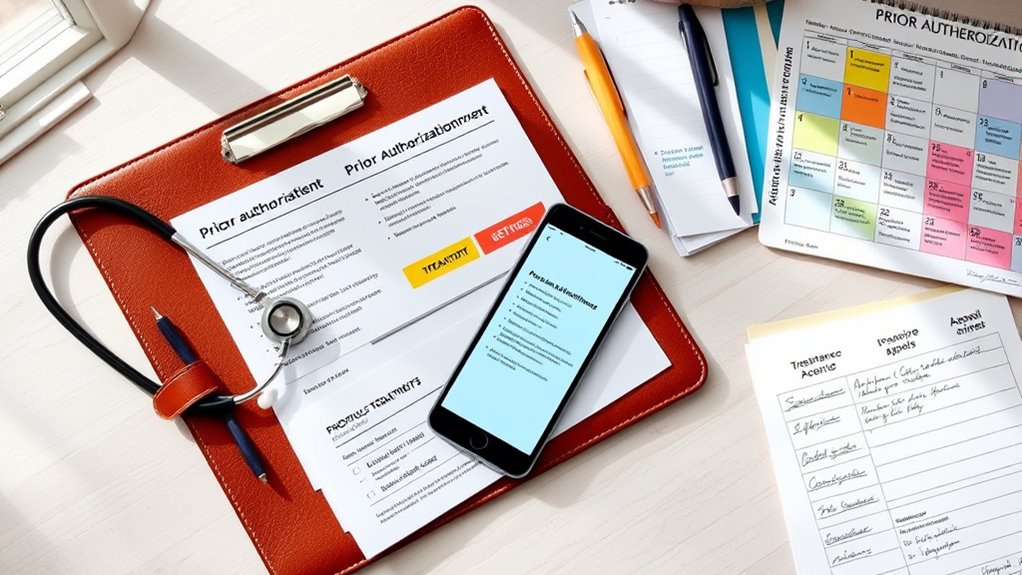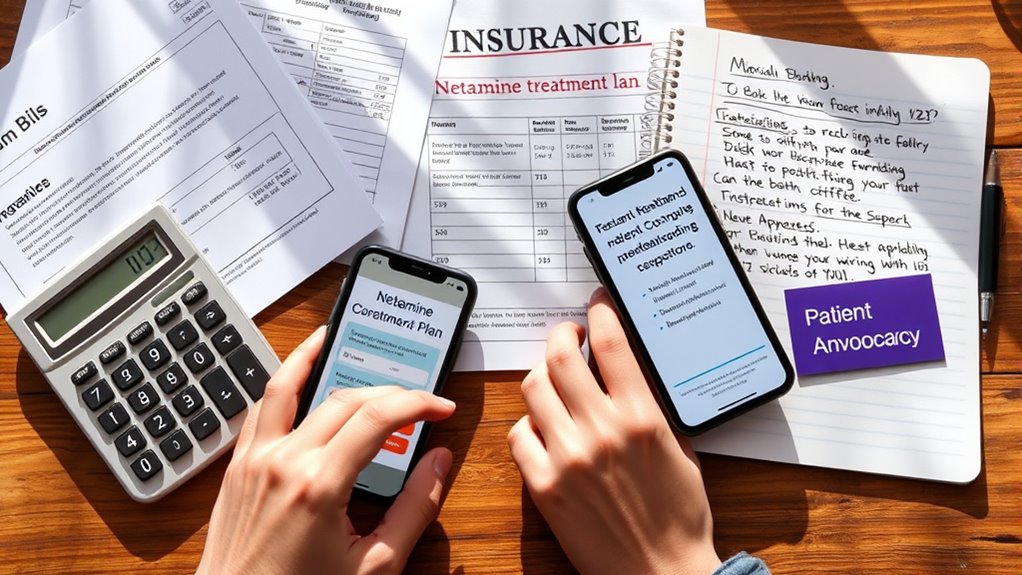To get ketamine infusions covered by insurance, initially verify your plan's mental health coverage and limitations on off-label treatments. Gather thorough documentation showing treatment-resistant depression with at least four failed medications. Find in-network providers or request a network gap exception if none are available nearby. Submit detailed prior authorization with proper CPT codes (96365, 99214) and a strong letter of medical necessity. Prepare for appeals citing clinical studies if denied. The following steps will equip you with specific strategies for maximum reimbursement.
Understanding Your Insurance Policy's Mental Health Coverage

When approaching ketamine treatment coverage, your initial step must be understanding your insurance policy's mental health provisions.
All ACA-compliant plans must cover mental health services as essential benefits, including psychotherapy, counseling, and inpatient treatment. Your policy can't impose stricter limits on mental health benefits compared to medical care due to parity laws.
Mental health coverage isn't optional – it's essential under the ACA, with protection from discriminatory limits through parity requirements.
Review your plan documents for specific coverage limitations regarding off-label treatments like ketamine. While 92% of insurers exclude IV ketamine, 78% cover FDA-approved esketamine (Spravato) for treatment-resistant depression.
Check if your plan requires proper referrals from your primary care physician or psychiatrist before approving specialized treatments like ketamine therapy.
Check if your plan covers virtual mental health services, which 45% of employer-sponsored plans include as in-network care. Verify emergency mental healthcare coverage, which must match physical emergency cost-sharing rates under federal law.
Understanding these details prepares you for the authorization process ahead.
Out-of-pocket costs will vary based on the coverage level you've chosen through your insurance plan.
Contacting your insurance company directly before starting treatment is advisable to determine if they consider ketamine a covered expense for your specific condition.
Gathering Essential Medical Documentation
Before pursuing insurance coverage for ketamine infusions, you'll need to compile thorough documentation that establishes both medical necessity and treatment appropriateness.
Start by obtaining extensive psychiatric evaluations documenting your diagnosis, treatment-resistant status, and exclusion of contraindications such as substance abuse or cardiovascular disease.
Collect detailed records of all previous treatment failures, including medication trials with specific dosages and durations, along with psychotherapy attempts.
You'll need baseline mental status exams completed within 30 days of proposed treatment.
Request medical clearance letters from your primary care physician or specialists.
Prepare laboratory results including urine toxicology, liver function tests, and creatinine levels.
If you have hypertension, document pre-treatment stabilization.
For women of childbearing capacity, include pregnancy test results.
Be sure to include thyroid function tests (TSH) and vitamin D assessments to rule out medical causes of depression.
These medical evaluations and treatment history records form the foundation of your insurance approval case.
Remember that ketamine infusion therapy is typically considered only after the failure of adequate antidepressant trials or other standard therapies for psychiatric disorders.
Most ketamine providers require standardized documentation for each infusion session to demonstrate consistent care delivery and treatment response.
Finding In-Network Providers vs. Out-of-Network Reimbursement

You'll need to verify if ketamine providers are in-network with your insurance by directly contacting both the clinic and your insurer, as standard provider directories often exclude these specialists.
For out-of-network clinics, negotiate reimbursement rates in advance and request detailed superbills with appropriate CPT codes to enhance your chance of partial coverage. Understanding insurance limitations is crucial when pursuing ketamine treatments, as policies vary significantly between providers. Avesta ketamine centers have partnered with the Reimbursify service to help patients maximize their insurance reimbursement potential.
If no in-network ketamine providers exist within a reasonable distance of your location, request a "network gap exception" from your insurer, which can grant in-network rates for otherwise out-of-network care. The off-label designation of ketamine for psychiatric conditions remains a primary reason for coverage denials, as insurance companies typically avoid covering treatments not FDA-approved for specific mental health indications.
In-Network Provider Verification
Finding ketamine providers within your insurance network presents significant challenges, as most clinics operate on an out-of-network basis due to insurers' reluctance to contract with them.
To verify potential in-network options, initially search your insurer's provider directories specifically for Spravato (esketamine) providers, as this FDA-approved treatment is more likely to be covered than ketamine infusions.
Contact your insurer's customer service line to confirm if any psychiatric or pain management specialists in their network administer ketamine treatments.
Focus your search on hospital-affiliated providers, as they're more commonly in-network than standalone ketamine clinics.
When conducting in-network verification, ask about specific coverage details for treatment-resistant depression or chronic pain diagnoses.
Also check if your employer partners with Enthea, which might offer ketamine therapy benefits through their network.
Some clinics may direct you to REMS certified providers who can administer Spravato as an alternative to traditional ketamine infusions.
If you're unable to find in-network options, remember that most insurance companies will accept out-of-network claims for ketamine treatments unless explicitly stated otherwise in your policy.
Be prepared to request a detailed superbill from your provider that includes all necessary information for insurance submission.
Reimbursement Rate Negotiations
After verifying potential in-network providers, understanding how reimbursement rates work becomes your next financial advantage point. Insurance companies negotiate different rates with providers, which directly impacts your out-of-pocket costs. Proper verification of insurance benefits before the first appointment is essential to maximize reimbursement and avoid billing issues later. Since insurance companies generally do not reimburse for ketamine treatments, patients should expect to pay out-of-pocket for most services. Most clinics charge $500 per infusion for both initial and subsequent ketamine treatment sessions.
| Provider Type | Typical Reimbursement | Negotiation Techniques | Documentation Needed |
|---|---|---|---|
| In-Network | 60-80% of contracted rate | Request bundled billing for ancillary services | CPT codes 96365, 99214 |
| Out-of-Network | 50-70% of UCR | Utilize measurement-based outcomes | Treatment resistance proof |
| BCBS PPO | $300-500 per session | Cite mental health parity laws | PHQ-9 score improvements |
| Medicare/Medicaid | Limited to Spravato | Appeal with peer-reviewed studies | Prior authorization forms |
Apply these reimbursement trends when negotiating: separate billable services from ketamine costs, confirm covered CPT codes during pre-authorization, and request payment plans while awaiting insurance processing. Track all correspondence with insurers to strengthen future appeals.
Network Gap Exceptions
When insurance networks lack specialized ketamine providers, gap exceptions offer a valuable pathway to reduce your financial burden. These exceptions allow out-of-network providers to be covered at in-network rates when no suitable providers exist within a 30-75 mile radius.
To establish gap exception eligibility, submit formal documentation proving medical necessity, treatment resistance, and geographic provider limitations. Include detailed clinical notes from your doctor demonstrating failed conventional treatments. Insurance companies may consider coverage for treatment-resistant depression, as ketamine infusions have shown efficacy for patients unresponsive to traditional antidepressants.
Your request must contain prior authorization and evidence that in-network alternatives simply don't exist.
If denied, implement appeal strategies immediately. Utilize peer-reviewed studies supporting ketamine's efficacy for your specific diagnosis, request peer-to-peer reviews between your provider and the insurer, and cite applicable state mental health parity laws. Remember that superbills are provided for out-of-network patients to help with reimbursement claims.
Successful approvals typically reduce your costs by 30-60%, depending on your plan's structure.
Securing a Strong Letter of Medical Necessity

To secure insurance coverage for ketamine infusions, you'll need a thorough letter of medical necessity from your prescribing physician. This letter should carefully document your treatment-resistant history, including at least two failed antidepressants from different classes and inadequate response to evidence-based psychotherapy for 6+ weeks.
Ensure the letter includes persistent symptom documentation (such as PHQ-9 scores ≥15) for at least 12 months, proper DSM-5 diagnoses, and evidence of functional impairment.
Patient advocacy requires understanding insurance terminology—specifically, how payers evaluate medical necessity.
The most compelling letters cite evidence-based justifications including NIH studies showing rapid reduction in suicidal ideation, meta-analyses demonstrating 60-70% response rates, and professional society endorsements. Emphasize ketamine's ability to provide rapid symptom relief within hours to days, unlike traditional medications that take weeks to work. Include applicable diagnostic codes such as F32.0 – F33.9 for depressive disorders to strengthen your case.
Request that your doctor specifically references peer-reviewed data showing ketamine's superiority to placebo and documented remission rates.
Proper Coding and Billing Strategies for Maximum Reimbursement
Selecting the correct CPT codes forms the backbone of your ketamine infusion reimbursement strategy, with 96365 for initial infusions and 96366 for each supplementary hour being critical for office-based treatments.
Your documentation must include specific details about ketamine dosage (measured in mg/kg), total volume administered, infusion duration, and clinical response to support medical necessity.
Remember to apply appropriate modifiers such as U4 with J3490 for the medication component and use POS 11 for office-based infusions to enhance your chances of successful insurance reimbursement. Submitting a detailed superbill from clinics can significantly improve your chances of receiving partial reimbursement from your insurance provider.
CPT Code Selection
Successful insurance reimbursement for ketamine infusions hinges on precise CPT code selection and strategic billing practices.
When submitting claims, lead with code 96365 for initial infusions lasting 16-90 minutes, adding 96366 for each extra hour of treatment. Never fragment billing for sessions under 16 minutes, as this triggers automatic reviews.
For thorough coverage, pair these infusion codes with J3490-U4 (unclassified drug with ketamine modifier) during prior authorization requests.
If providing pre-infusion consultations that address separate clinical issues, append E/M codes (99213/99214) with modifier 25.
Understanding CPT code subtleties related to infusion duration is critical—document exact treatment times in your clinical notes to support time-based coding.
Avoid billing ancillary services separately, as these are typically bundled into the primary infusion codes.
Insurance-Ready Documentation
Thorough documentation forms the bedrock of successful ketamine infusion reimbursement, requiring careful attention to both clinical and administrative details.
Your documentation best practices should include obtaining signed informed consent forms acknowledging off-label use and attaching treatment-resistant condition evidence to establish medical necessity.
Maintain extensive treatment logs documenting dose calculations, essential signs, and symptom improvement metrics using standardized scales like PHQ-9.
For ideal insurance claim processes, verify your superbills contain:
- Provider credentials, NPI numbers, and tax ID
- Specific ICD-10 diagnosis codes linked to FDA-approved indications
- Appropriate HCPCS code J3490 with U4 modifier
- Separate billing codes for each infusion component
- Precise billing units (1 unit = 1 mL)
Submit documentation within 30-90 days to meet insurer deadlines, with referral letters from psychiatrists strengthening your case.
Navigating the Prior Authorization Process

The complex expedition through insurance approval for ketamine infusions begins with mastering the prior authorization process.
Submit your request 2-4 weeks before your intended treatment date through your insurer's portal or fax system. Use precise billing codes—CPT 96365 (IV infusion, initial hour) alongside J3490 (unclassified drug)—avoiding ambiguous "injection" codes that trigger automatic denials.
Timing and precision in billing codes make the difference between approval and automatic rejection of ketamine treatment requests.
When completing authorization forms, verify both your prescribing physician and infusion clinic provide required signatures. Include diagnosis codes that accurately reflect your condition (such as F33.2 for major depressive disorder) alongside ketamine's anesthesia designation.
Remember to document all prior treatment failures thoroughly.
Common pitfalls include insufficient documentation of previous therapies, missing medical necessity statements, and incorrect billing codes.
Address these prior authorization tips proactively to increase your approval chances notably.
Effective Appeals for Denied Claims
Four critical steps form the foundation of an effective ketamine treatment appeal after receiving a denial letter. Understanding the legal requirements for insurers while preparing thorough documentation creates the strongest case for reversal.
- Analyze denial reason – 89% cite "experimental" status despite 23 clinical trials proving efficacy; request specific policy clauses per 42 CFR 438.404.
- Compile medical necessity evidence – Submit studies showing 70% response rates vs 13% for traditional medications, plus documented treatment history with ≥4 failed antidepressants.
- Follow structured appeal protocols – File within 180 days; request peer-to-peer review with psychiatry medical director; invoke state external review laws after 2 denials.
- Apply regulatory pressure – Cite ACA parity laws, state mandates, and ADA protections while documenting 85% decrease in suicidal ideation metrics.
Alternative Funding Options When Insurance Falls Short

While appealing denied claims represents your strongest path to insurance coverage, many patients still face the financial burden of ketamine therapy after exhaustion of all insurance options.
Fortunately, several financing options exist to make treatment accessible.
Consider medical financing programs like CareCredit's 0% interest plans (6-18 months) or Advance Care's 14-month interest-free financing with limits up to $25,000.
For those with lower credit scores, MyMedicalFunding offers installment loans starting at 6.59% APR.
HSAs and FSAs provide tax advantages with 2024 contribution limits of $4,150/$8,300 (HSA) and $3,200 (FSA).
Non-profit assistance through organizations like Serenity Foundation or Thank You Life offers subsidies for qualified applicants.
Veterans should investigate VA Community Care Network coverage, while primary responders can access 15-25% discounts at participating clinics.
Frequently Asked Questions
How Long Will Insurance Coverage for Ketamine Infusions Typically Last?
Insurance coverage duration for ketamine infusions typically ranges from 4-12 weeks initially.
You'll find most private insurers limit coverage to 6-8 infusions annually, even with authorization. Coverage extensions depend on documented symptom improvement of ≥50% on standardized assessments.
Your infusion frequency often decreases during maintenance phases (from weekly to monthly), which may improve approval odds.
VA insurance may offer indefinite coverage for veterans, while Medicare covers FDA-approved Spravato but rarely IV ketamine.
Can I Change Providers Mid-Treatment Without Affecting My Coverage?
Changing providers mid-treatment may impact your coverage.
Provider shifts often require re-verification of benefits since authorizations are frequently facility-specific.
Contact your insurance company before making any changes to confirm if you'll need new pre-authorizations or referrals.
Some insurers may reset your benefit cycle or require supplementary documentation from your new provider.
Always request a coverage verification in writing to protect yourself from unexpected coverage implications during the shift.
Will Insurance Cover Ketamine for Conditions Other Than Depression?
Insurance coverage for ketamine to treat alternative conditions beyond depression is limited.
Most policies don't cover off-label uses, though exceptions exist. You'll find better chances with chronic pain and PTSD, especially through VA partnerships.
Some insurers may approve treatment with extensive documentation and prior authorization. Always check your specific policy details, request coverage codes from your provider, and prepare to appeal denials with medical necessity evidence from your doctor.
How Does Pregnancy Affect Ketamine Infusion Coverage Eligibility?
Pregnancy almost always disqualifies you from ketamine infusion coverage. Most insurers consider pregnancy a hard contraindication due to fetal neurotoxicity risks.
You'll face immediate denial if pregnancy is identified during treatment, with 90% of clinics listing it as a contraindication.
Instead, investigate FDA-approved treatment alternatives with established pregnancy safety profiles. If you're pregnant, insurers will direct you to conventional therapies like certain SSRIs rather than covering ketamine's potential pregnancy complications.
Do Insurance Companies Track Ketamine Therapy Outcomes for Future Claims?
Yes, insurance companies often track your ketamine therapy outcomes.
They collect data through required documentation like post-treatment progress reports, standardized depression scale scores (PHQ-9, GAD-7), and clinical outcome assessments.
You'll notice this tracking when they request treatment effectiveness evidence for continued coverage approval.
Medicare and VA insurance particularly mandate detailed outcome documentation.
This tracking helps insurers evaluate cost-effectiveness and determine eligibility for future claims or continued treatment authorization.

